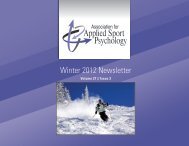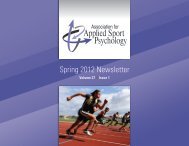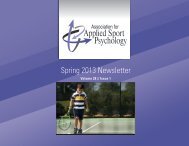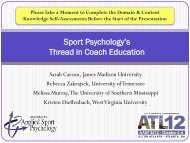Performance Excellence Movement - Association for Applied Sport ...
Performance Excellence Movement - Association for Applied Sport ...
Performance Excellence Movement - Association for Applied Sport ...
Create successful ePaper yourself
Turn your PDF publications into a flip-book with our unique Google optimized e-Paper software.
<strong>Per<strong>for</strong>mance</strong> <strong>Excellence</strong> <strong>Movement</strong><br />
December 2009; Vol. 6(1)<br />
the area of sport and exercise psychology can play an integral role in the development of coaching education<br />
programs. In the following article, I discuss my own experience developing a program to be utilized with<br />
coaches. I hope that this will help students realize that there are endless opportunities in the field, and that<br />
with creativity, determination, and commitment one can combine their previous training with their passion.<br />
During the pursuit of my Master’s degree in <strong>Sport</strong> and <strong>Per<strong>for</strong>mance</strong> Psychology at the University of<br />
Denver I decided to obtain a job where I could utilize the knowledge I was attaining in class. I applied to<br />
become an employee of an outdoor fitness company called BCOR Fitness in Colorado, where I have now<br />
been working <strong>for</strong> 2 years as a personal trainer and fitness instructor. The company is unique in the fact that it<br />
is based on the principle of social fitness <strong>for</strong> everyone. The trainers are called coaches and work hard to<br />
create a social, fun environment while delivering great workouts. As I was preparing to become an instructor<br />
in this company, I found that there were many aspects of per<strong>for</strong>mance within the position. I found myself<br />
utilizing my knowledge in sport and exercise psychology almost everyday at work, especially my academic<br />
training and research in self-reflection and mentoring. As a graduate student, my main research focus has<br />
been on these concepts and in my current job I have been able to implement various self-reflection and<br />
mentoring tactics to help improve my per<strong>for</strong>mance in the fitness field.<br />
After working at BCOR Fitness <strong>for</strong> several months, I started to advance within the company. Eventually,<br />
I was responsible <strong>for</strong> training the other fitness coaches. During this transition I looked to my educational<br />
training and the coaching education literature <strong>for</strong> resources that I could use. I found several studies (only one<br />
is referenced here, if there were several it is best to list them) suggesting that most coaches are not aware of<br />
their own actions within their own environment (e.g. Coaching Behavior Assessment System; Curtis, Smith,<br />
& Smoll, 1979). Similar to athletes, coaches that have greater self-awareness are more likely to have better<br />
focus and think more quickly under pressure. Various methods of <strong>for</strong>mal and in<strong>for</strong>mal self-reflection, such<br />
as journal writing or process and feedback sessions with mentors, have been successfully applied in the<br />
organizational setting to enhance employee leadership and per<strong>for</strong>mance (Knowles et al., 2006). Based on this<br />
research, as well as my own experience with self-reflection, I thought these methods could help our coaches<br />
at BCOR Fitness through exploration of their areas of strength and growth, and ways in which they could<br />
improve as coaches. I had already been implementing these techniques to enhance my own per<strong>for</strong>mance as a<br />
coach in an in<strong>for</strong>mal manner and found them to be effective. For example, after every class I taught I would<br />
ask myself the following questions: 1)”What is one thing I did well?” ; 2) “What is one thing I could<br />
improve upon?”; and 3) “What can I do between now and next class to improve?” In my opinion, this<br />
process helped increase my own self-awareness and to become a better coach.<br />
Along with reflection, I knew that mentoring was important in<br />
coaching and training. Throughout my preparation to become a<br />
fitness coach I had a seasoned coach with me through every step<br />
of the process. She was a great resource to bounce ideas off of and<br />
she assisted me in enhancing my own self-reflection methods. This<br />
mentoring relationship was one of the keys to my success. In addition,<br />
I had done research in this domain, which indicated that mentoring<br />
is one of the greatest roles that a coach can adopt because athletes<br />
and assistant coaches look to head coaches <strong>for</strong> advice and leadership<br />
(Cassidy & Rossi, 2006; Erikson et al., 2007). Due to this research, in<br />
conjunction with my own personal experience, I decided to develop a<br />
self-reflection and mentoring component to enhance the overall coach<br />
training <strong>for</strong> the company. I designed a reflection journal and mentoring piece to be incorporated into the<br />
coach training process. The component is structured to have an initial educational session during the<br />
certification training. From here the coaches in training are required to fill out a post-workout reflection,<br />
which they review with their head coach. Then, they collaboratively make a plan and set goals about how to<br />
improve during their next workout. As a seasoned fitness coach, I remember that having another coach as a<br />
5






